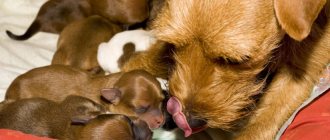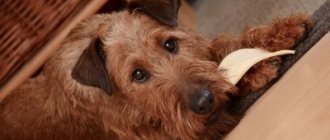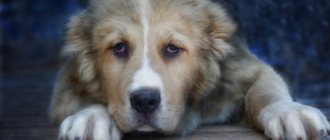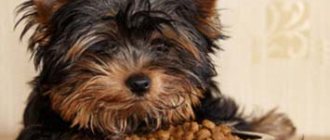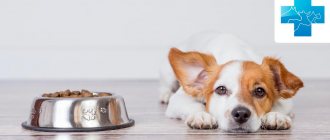Many dog owners are familiar with the situation when the animal refuses to eat. Why is this happening? What to do and how to help your four-legged friend? First of all, remember that your dog eats not because it tastes good, but to replenish his daily supply of essential nutrients. If this does not happen, you should observe the dog and figure out what happened to it and whether there are any symptoms of the disease.
| Calling a veterinarian to your home | For free |
Why don't they feed after the first contractions?
Contractions are a process that affects all systems of the body, and it should be alleviated as much as possible. And a full stomach makes contractions more difficult. And the reasons for this are as follows:
- the dog’s body temperature drops, which leads to a slowdown in metabolism and interruption of digestion (therefore, bitches at this time refuse to eat themselves);
- the first born puppy is the largest, and advancement through the birth canal is more difficult if the “mommy’s” intestines are full;
- contractions for a well-fed dog are more difficult than for a hungry dog and last longer;
- If a bitch gives birth on a full stomach, she may vomit or have involuntary bowel movements, both of which are stressful for her.
Why does my dog often breathe with his mouth open?
The cause of rapid breathing can be both physiological characteristics and pathologies. This is absolutely normal if the dog is breathing frequently due to physiological changes in its body, which are associated with the need to speed up metabolism and metabolism.
Why does a dog often breathe with its mouth open?
- Such changes include excitement. That is, the dog is scared or, conversely, happy. In this case, it is quite normal for her to breathe frequently and stick out her tongue.
- After a long run or other physical activity, perhaps competition, the dog may also pant and stick out its tongue.
- Dogs in heat, like women on their period, feel a little strange and not very good.
- Blood pressure and temperature may increase. Therefore, rapid breathing during pregnancy, childbirth, and estrus is absolutely normal. High ambient temperature.
A pet
Feeding after childbirth
The answer to the question depends on whether the bitch ate the placenta or not. The afterbirth contains vitamins, hormones, iron, oxygen and proteins that are beneficial to the dog. This together helps her recover. In addition, nature dictates that the bitch eats the placenta, hiding the smell of blood and protecting the puppies.
For domestic dogs this is not necessary, but the instinct remains. And therefore, the correct feeding of a dog after birth will be as follows:
- if “mommy” has eaten the placenta, and they are very nutritious, there is no need to feed her - she will not feel hungry for 5 or 6 hours;
- if the placenta has not been eaten, then you should offer a sweet drink, the same tea with a spoonful of sugar, and you can feed it after an hour or two.
You should not allow your dog to eat more than 2 or 3 afterbirths, otherwise he will develop diarrhea.
What to give for diarrhea?
If the bitch nevertheless ate a lot of afterbirth, and her stomach is upset, to alleviate the condition, you need to feed only rice porridge:
- rice is soaked in advance at least overnight;
- then fill it with cold water;
- no spices or salt should be added;
- cook until very swollen.
You should not make porridge with milk, because dogs do not digest it well, and the diarrhea gets worse.
Under no circumstances should you offer the bitch medication for diarrhea: it will pass into the milk and harm the health of the puppies.
The amount of food needed in the first 4-6 weeks should increase. This happens gradually.
For example, in the second week after the birth of the cubs, the amount of food is doubled. And in the third week - at three.
In addition, the amount of food depends on the number of puppies born. And there is even a formula for how to calculate it using this indicator. To do this you need:
- after the puppies are at least 4 days old, they all need to be weighed at once;
- For every kilogram of the total weight of the litter, you need to increase the amount of food for the “mommy” so that the calorie content increases by 250 calories.
Feeding during lactation
Everything that the bitch eats ends up in her milk, one way or another. And in the first place is not so much the quantity as the quality of milk. And the peculiarities of feeding depend on its maintenance. So, nursing dogs need food that contains:
- a lot of calcium;
- easily digestible proteins;
- carbohydrates;
- fats;
- minerals.
And after consulting with a veterinarian, a suitable vitamin complex is selected for the dog, which supports lactation and restores the health of the “mommy”.
Postpartum diet. After giving birth, it is imperative to feed the bitch with water-based porridges: oatmeal, buckwheat and wheat, and the cereal should be heavily boiled. Dairy products such as cottage cheese, cheese or kefir are needed.
Until at least 6 days have passed after birth, the dog should not be fed raw vegetables, as this will cause diarrhea in the puppies.
What and how to feed a dog after giving birth depends on the period:
- in the first week: porridge, fish products and cottage cheese;
- in the second week: meat broth, but there should be no bones in the food, pieces of raw meat;
- in the third week: during this period you can dilute the diet with vegetables and bone meal, mineral mixtures will work well;
- in the fourth to sixth week: the amount of food for the dog decreases (puppies will soon be switched to complementary foods), but the calorie content should not decrease.
Requirement for vitamins and microelements. During the postpartum period, the bitch needs a special amount of vitamins in order not only to restore body functions and support immunity, but also to transfer microelements necessary for development to the puppies through milk.
Required:
- vitamins of group A (they are fat-soluble, should not be given in large doses);
- vitamins B1, B2, B9, B12 (they are water-soluble and do not accumulate in the body, so they can be given frequently);
- vitamins C (water soluble, but the dose should be moderate);
- vitamins of group D in large quantities (responsible for the production of calcium).
Is it possible to give dry food? Yes, if it is food specifically for nursing dogs. Why is it important? Because such food contains a balanced amount of mineral supplements, microelements and vitamins that are needed for “mother” and puppies.
If this is premium or superpremium class food, then separate vitamin and mineral supplements are not needed. In the case of economy class food, they are necessary. If mommy develops an allergy, she can eat special hypoallergenic food.
If a lactating bitch eats dry food, then regardless of its class, she needs plenty of fluids and an increased amount of dairy products.
Diet for eclampsia. Milk fever (eclampsia) occurs from an acute deficiency of calcium in the body. The symptoms are terrible, develop quickly, and cannot be confused with any other ailment:
- body temperature increases sharply and strongly;
- heart rate increases, shortness of breath begins;
- balance is lost, coordination is lost;
- the dog has a darting look, barks for no reason, does not pay attention to puppies and is worried;
- loss of appetite, the animal does not drink, its pupils are dilated;
- paw tremor begins, which quickly turns into convulsions (the dog remains conscious).
If these symptoms occur, the bitch must be taken to the doctor immediately, otherwise she will go into a coma and then die. You can't hesitate.
At risk are:
- dogs of small breeds, and the smaller, the higher the risk;
- malnourished;
- dogs that have problems with the thyroid gland.
If the bitch is prone to eclampsia, you need to carefully monitor the diet so that the disease does not recur. Give premium and superpremium food that is specially balanced, because if there is an excess of calcium, the animal will get sick again.
Mandatory foods in the diet of a nursing dog
The dog's diet should be varied; only under this condition will lactation proceed without complications for the animal and bring maximum benefit to the puppies.
Products that should be present in the diet of a nursing female:
- Buckwheat, oatmeal, rice and other porridges;
- Lean meat;
- Sea fish;
- By-products;
- Milk;
- Kefir;
- Cottage cheese;
- Fresh vegetables;
- Greenery.
It is important that all products consumed by the dog are of high quality and fresh, otherwise there is a risk of poisoning of the young mother and her puppies.
What to do if you refuse to eat?
If the animal does not eat immediately after birth, there are three reasons for this: fatigue, anxiety and placenta. What to do?
When labor is difficult, your dog may become very tired. In this case, she will not eat. And you shouldn't force feed. You can offer to drink and wait an hour or two: when he rests, his appetite will return.
If labor is over, but contractions continue, the dog will be restless and will not be able to feed it. This may mean there is an afterbirth or a puppy inside. In this case, you need to contact a veterinarian who will give the dog appropriate stimulation.
If a dog refuses to eat after giving birth, but has eaten the placenta, then it will not feel hungry for 5-6 hours to 3 days (depending on how much it ate). Here you can only wait.
Loss of appetite during feeding is considered a dangerous symptom. This means the dog is seriously ill and needs to be taken to the vet immediately so he can do blood tests and an ultrasound.
Feeding with prepared food
Feeding dogs accustomed to dry food during lactation should be changed taking into account certain rules:
- immediately after birth, dry food must be soaked in water or replaced with liquid food, since a large amount of water is needed to digest this type of food;
- in addition to feed, the animal’s menu should include fermented milk products and vitamin and mineral supplements;
- The protein ratio in food for lactating bitches should be 24-28%.
Expensive, high-quality food, as a rule, already contains the required amount of vitamins and minerals. If the dog eats cheaper food, then adding food additives to its diet is necessary.
The dog does not feed the puppies after giving birth
Veterinarians identify three main reasons for this behavior in dogs:
- There is no maternal instinct, which does not happen often, but it does happen.
- The bitch is worried (not feeling well or sick).
- Puppies with congenital defects or weaknesses (dogs rarely refuse to nurse these pups, but it does happen).
In the first case, artificial feeding of puppies is recommended, because nothing can be done with their “mother”.
In the second case, when the dog does not feed the puppies after giving birth due to stress or health, it is necessary for her to calm down and get better. Then she will take care of the cubs again.
The third option is also artificial feeding. It is possible in two forms:
- the owner can bring a wet-nurse bitch, and if she accepts the puppies, she will get them out without any problems;
- The owner will prepare special mixtures for the puppies himself.
About visiting the veterinarian
Puppies are vulnerable in the first weeks after birth. Everything is passed on to them through their mother's milk, and diseases develop in them much faster than in an adult dog. And if medical assistance is not provided as soon as possible, the outcome will be disastrous.
Hence the importance of the health of the bitch, which also becomes vulnerable after giving birth and during feeding. And in order not to lose either the “mommy” or the litter, it is better to contact a veterinarian in time.
In conclusion, we can say that proper, balanced nutrition for a dog and adherence to a feeding regimen are the most important factors not only for maintaining its health, but also for the development and growth of strong, healthy, strong puppies. And let these kids be worthy of the title of the largest or most beautiful dogs.
Additionally, we suggest you watch a video about feeding and behavior of a bitch in the first days after giving birth:
